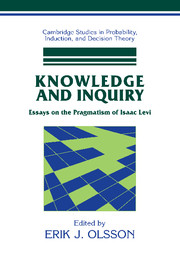Book contents
- Frontmatter
- Contents
- List of Contributors
- Preface
- Introduction: The Pragmatism of Isaac Levi
- 1 Isaac Levi and His Pragmatist Lineage
- 2 Is Pragmatist Truth Irrelevant to Inquiry?
- 3 The Knowledge Business
- 4 Infallibility and Incorrigibility
- 5 Why Inconsistency Is Not Hell: Making Room for Inconsistency in Science
- 6 Levi on Risk
- 7 Vexed Convexity
- 8 Levi's Chances
- 9 Isaac Levi's Potentially Surprising Epistemological Picture
- 10 Isaac Levi on Abduction
- 11 Potential Answers – To What Question?
- 12 Levi and the Lottery
- 13 The Value of Truth and the Value of Information: On Isaac Levi's Epistemology
- 14 Decision-Theoretic Contraction and Sequential Change
- 15 Deciding What You Know
- 16 Levi's Ideals
- 17 The Mind We do Not Change
- 18 Psychoanalysis as Technology
- 19 Levi on Money Pumps and Diachronic Dutch Books
- 20 Levi on the Reality of Dispositions
- 21 Replies
- Index
- References
13 - The Value of Truth and the Value of Information: On Isaac Levi's Epistemology
Published online by Cambridge University Press: 05 March 2010
- Frontmatter
- Contents
- List of Contributors
- Preface
- Introduction: The Pragmatism of Isaac Levi
- 1 Isaac Levi and His Pragmatist Lineage
- 2 Is Pragmatist Truth Irrelevant to Inquiry?
- 3 The Knowledge Business
- 4 Infallibility and Incorrigibility
- 5 Why Inconsistency Is Not Hell: Making Room for Inconsistency in Science
- 6 Levi on Risk
- 7 Vexed Convexity
- 8 Levi's Chances
- 9 Isaac Levi's Potentially Surprising Epistemological Picture
- 10 Isaac Levi on Abduction
- 11 Potential Answers – To What Question?
- 12 Levi and the Lottery
- 13 The Value of Truth and the Value of Information: On Isaac Levi's Epistemology
- 14 Decision-Theoretic Contraction and Sequential Change
- 15 Deciding What You Know
- 16 Levi's Ideals
- 17 The Mind We do Not Change
- 18 Psychoanalysis as Technology
- 19 Levi on Money Pumps and Diachronic Dutch Books
- 20 Levi on the Reality of Dispositions
- 21 Replies
- Index
- References
Summary
A SERMON ON EPISTEMOLOGY
“I preach a sermon on epistemology,” says Levi (2004, p. 77). Isaac Levi is an immensely interesting and powerful philosopher. In my opinion, he has erected a most impressive epistemological edifice in the past forty years. Inspection of current collections on epistemology, however, reveals that there is little interaction between Levi's work and almost any version of mainstream justification-based or reliability-based epistemology. Why is this?
First, Levi resolutely distances himself from many main tenets of mainstream epistemology. He is very decidedly against any sort of “pedigree epistemology” (2004, pp. 11, 232), which holds that whether some belief counts as knowledge is dependent on its origin or its foundation, on where it comes from. He rejects the idea that convergence to the truth is the ultimate aim of inquiry (1980, pp. 70–2). And he is averse to “Parmenidean epistemology” (2004, pp. 10–12), according to which only logical, mathematical, or conceptual necessities should be admitted as full beliefs, while everything else should get assigned a degree short of “the Permanent One” (2004, p. 10).
For Levi, taking his position just means being true to the pragmatist stance. At any given point of time, a believer doesn't have to justify his or her currently held beliefs, since there is nothing other than the current set of beliefs on which the evaluation of the believer's mental state could be based (in Levi's terminology, there is no other “standard of serious possibility”).
- Type
- Chapter
- Information
- Knowledge and InquiryEssays on the Pragmatism of Isaac Levi, pp. 179 - 200Publisher: Cambridge University PressPrint publication year: 2006
References
- 4
- Cited by

